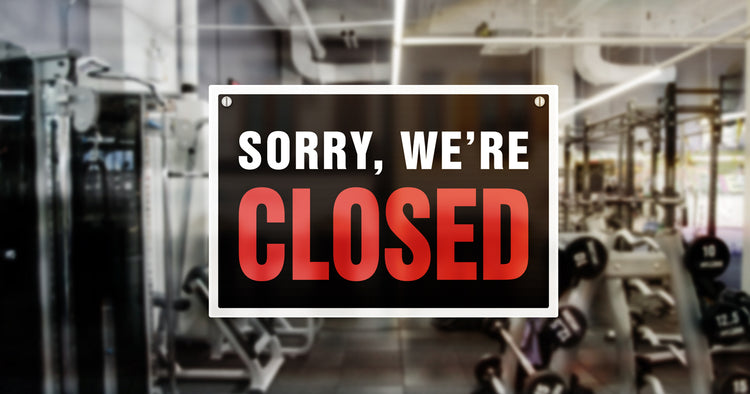Fitness facilities worldwide were and continue to be impacted by the COVID-19 pandemic. Just a short 15 months ago, restrictions implemented by governments everywhere either closed or drastically changed the way these facilities could operate and conduct business.
Business owners, employees, and members became buried with uncertainty. Physical training facilities enrolled roughly 70 million Americans in early 2020, and almost all of them were affected by the closures.
On the surface, these facilities serve as a way for humans to challenge their bodies to improve using various methods and different pieces of equipment. Here are our favorite pieces of exercise equipment to get you started.
Health and wellness professionals echoed for decades what we have just learned during the lockdown. Gym closures have affected our mental health in addition to our physical health.
Gym Closures Affect Mental Health
1. Lack of Community
Community is arguably the most beneficial mental health benefit to belonging to a gym. Feeling like we belong and share interests with others are compelling and motivating. The power of numbers and teamwork are well documented across history, and the local cycle studio or commercial gym that you and a group of your friends and peers attend is no different.
2. Social Distance
I spoke last month about replacing the term “social distance” with “physical distance.” Maintaining physical distance is essential for slowing the spread of germs. However, we as humans are social beings. Most of us require human interaction and want to stay social with friends and family. The gym gave us an outlet to let loose and socialize with others.
3. Accountability & Sense of Purpose
A strong sense of purpose comes from having goals, desires, and aspirations that help shape your future. Most gym-goers are constantly improving, whether gaining strength, shedding body fat, or simply showing up more times than last month.
Being accountable to others increases adherence in comparison to only being accountable to yourself. We are more likely to show up to a workout or not binge on indulgences when we know a coach, friend, or community will find out.
4. Low Self Esteem/Confidence
When working out at the gym is a part of your routine, accountability and a strong sense of purpose spills over and creates a positive ripple effect. The physical act of increasing heart rate, sweating, and strength training increase feel-good hormones like endorphins and serotonin.
These hormones then spill over to improve our self-esteem and confidence because we believe more in our abilities. Increased perception of our capabilities is a result of the progress of our efforts. Feel good, look good, do good.
How to overcome gym closures
March 2020 may have been the last time you will ever step foot into a gym. And to be honest, that is perfectly fine. The home-fitness trend is accelerated, and now that everyone in the country is not ordering dumbbells and cycle bikes, now is the optimal time to pivot away from a gym membership. Here are ways to replicate the gym experience at home to stay mentally healthy.
1. Do what you love
One of the perks of joining a gym is the variety of equipment and classes offered. However, it is easy to become overwhelmed and lose focus on your goals with so many options. Starting a home gym allows you to focus on what you love and want to prioritize.
We often speak about the value of a balanced exercise program, including strength, cardio, flexibility, and everything in between. However, it is not always an option to have multiple pieces of equipment in your home. Choose just one piece of cardio or strength equipment to get started and make it something you love.
Focus less on the best piece of equipment out there and more about what you will be most likely to use consistently. Because the best workout is the one you will adhere to and regularly perform. Here are our top fitness sellers.
2. Join a fitness community
There is no shortage of groups that offer support, mentorship, and accountability in the fitness community. There is a substantial social component around working out. Whether it be one friend or a group of friends, we know program adherence drastically increases when we are part of a community.
Social media platforms, fitness apps, and local groups offer a wide range of fitness communities. Support, encouragement, and accountability are three great qualities of a good fitness club. Here is the Sunny Health & Fitness Facebook support community.
3. Track your progress
I will end up sounding like a broken record, but this is worth repeating… Track your progress! Working out at home is incredibly convenient, but it can easily lead to a lack of recording your workout.
Set your goals, then establish 2-5 indicators you want to improve based on these goals. Write them down, and record your progress every 2-4 weeks. There is nothing less motivating than not making progress. It is a significant reason people give up and lose interest in working out.
Stay on track and keep progressing to avoid the frustration of spinning your wheels. We have talked about how you can set up new year fitness goals. Later this month, we will discuss the importance of taking selfies as another way to track and positively impact your fitness journey.
BEST FITNESS EQUIPMENT FOR GETTING STARTED WITH NEW YEAR FITNESS GOALS
HOW EXERCISING CAN IMPROVE MENTAL HEALTH
7 SIMPLE WAYS TO REDUCE & RELIEVE STRESS
SELF CARE: TOP 8 WAYS TO TAKE BETTER CARE OF YOURSELF
Recommended Products:
Endurance Indoor Exercise Cycle Bike
Add to Cart
Phantom Hydro Water Rowing Machine
Add to Cart
Incline Treadmill
Add to Cart,

